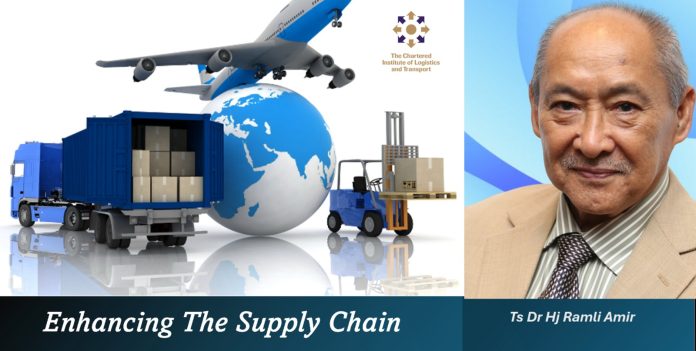By Ts Dr. Hj Ramli Amir, former President of the Chartered Institute of Logistics and Transport (CILT) Malaysia and Vice-President of CILT International for Southeast Asia
KOTA KINABALU: Sabah renowned for its rich marine biodiversity and extensive coastline, has embarked on an ambitious Blue Economy agenda that promises to revolutionise its approach to ocean-based development. This comprehensive initiative seeks to harness the full potential of Sabah’s marine resources whilst ensuring sustainable development and environmental conservation. The agenda’s scope is impressively broad, encompassing various sectors and addressing multiple challenges faced by the state.
Economic Pillars
At the core of Sabah’s Blue Economy agenda lie several key economic pillars, each designed to maximise the state’s marine potential. Fisheries and aquaculture stand out as crucial components, with staggering potential for growth. The estimated annual yield of fish and prawns exceeds 491,000 tonnes, valued at a remarkable RM3.25 billion. However, current utilisation falls short of this potential, with less than 50% being tapped. This underutilisation presents a significant opportunity for expansion and economic growth within the fishing industry.
The agenda places considerable emphasis on sustainable fishing practices and aquaculture development. By implementing modern techniques and technologies, Sabah aims to increase its fish production whilst maintaining the delicate balance of its marine ecosystems. This approach not only promises economic benefits but also ensures food security for the region.
Renewable energy forms another cornerstone of the agenda, with particular focus on Ocean Thermal Energy Conversion (OTEC) technology. This innovative approach harnesses the temperature difference between warm surface waters and cold deep waters to generate electricity. Sabah’s geographical location and ocean conditions make it ideally suited for OTEC implementation, with the potential to produce up to 20,000 MW of energy. This significant capacity could not only meet Sabah’s energy needs but also position the state as a leader in sustainable energy production in Southeast Asia.
Tourism and Marine Biotechnology
The Blue Economy initiative recognises the immense potential of Sabah’s natural marine beauty for tourism. The scuba diving industry in Sabah’s Marine Parks is a particular focus, with efforts aimed at promoting sustainable tourism practices. This approach seeks to balance economic benefits with environmental preservation, ensuring that Sabah’s coral reefs and marine life continue to thrive whilst supporting a robust tourism industry.
The agenda goes beyond traditional tourism, exploring innovative ways to leverage Sabah’s marine resources. Marine biotechnology presents an exciting avenue for development, with potential applications in pharmaceuticals, cosmetics, and nutrition. By investing in research and development in this field, Sabah aims to position itself at the forefront of marine biotechnology innovation, potentially leading to the creation of high-value products and industries.
Environmental Conservation and Fresh Water Production
Environmental considerations are intricately woven throughout Sabah’s Blue Economy agenda. Blue carbon initiatives, which focus on the carbon sequestration potential of coastal and marine ecosystems, form a key component of the state’s decarbonisation efforts. By protecting and restoring mangroves, seagrass beds, and other coastal habitats, Sabah not only contributes to global climate change mitigation but also enhances its coastal resilience against rising sea levels and extreme weather events.
The agenda also addresses one of the most pressing challenges faced by many coastal regions: water scarcity. By exploring desalination processes, Sabah aims to secure a sustainable fresh water supply for its growing population and industries. This forward-thinking approach to resource management demonstrates the state’s commitment to long-term sustainability and resilience.
Maritime Transport and Security
Shipping and maritime transport feature prominently in Sabah’s Blue Economy agenda. The infrastructure developments aim to catalyse the state’s economy by improving connectivity and facilitating trade. The focus on maritime transportation extends beyond mere infrastructure development. The agenda emphasises the need for technology adaptation in ocean monitoring and surveillance. This focus on maintaining security and sovereignty in Sabah’s waters is crucial for ensuring safe shipping operations and protecting maritime interests.
A Holistic Vision
What sets Sabah’s Blue Economy agenda apart is its holistic approach to ocean-based development. It recognises that the various components of the marine economy are interconnected, and that sustainable development requires a balanced approach. The agenda aims to drive economic growth across multiple sectors while simultaneously prioritising environmental conservation and sustainable practices.
This holistic vision extends to social considerations as well. The initiative focuses on community empowerment and improving livelihoods, particularly for coastal communities that have traditionally depended on the ocean for their sustenance. By creating new economic opportunities in sectors such as sustainable fishing, eco-tourism, and marine biotechnology, the agenda aims to uplift these communities whilst ensuring their traditional knowledge and practices are respected and integrated into the new blue economy.
Governance and International Collaboration
Effective governance plays a crucial role in the success of Sabah’s Blue Economy agenda. The initiative calls for integrated maritime governance and enhanced monitoring and enforcement. This approach ensures that development occurs within a well-regulated framework that balances economic interests with environmental and social considerations.
Recognising the global nature of ocean-based economies, Sabah’s Blue Economy agenda emphasises international cooperation. The state is actively seeking collaboration with international investors and neighbouring countries, fostering a spirit of shared responsibility and mutual benefit in the development of ocean resources. This collaborative approach not only brings in much-needed expertise and investment but also positions Sabah as a responsible global player in ocean resource management.
Education and Training
Based on the search results provided, several institutions and initiatives in Sabah are well-positioned to undertake the training and upskilling of personnel for the Blue Economy.
KASI Maritime Training headquartered in Kota Kinabalu, Sabah, provides professional training in marine engineering, navigation, and maritime traffic management. They offer STCW compliant courses and have state-of-the-art ship handling simulation facilities. Their training programs cover various aspects of maritime operations, including ship handling, pilotage, electronic navigation, tug operations, and VTS simulation training.
BIMP-EAGA Maritime Academy (BEMA):
POIC Sabah, in collaboration with Sealestial Marine Seafarer Training Centre (SEAMASTER), University College Sabah Foundation, and the BIMP-EAGA Business Council, is planning to establish BEMA at POIC Lahad Datu. This academy aims to produce trained workers for the maritime industry, enhance Sabah’s position as a logistics hub, and offer job training and advancement opportunities for Sabahans. The Chartered Institute of Logistics and Transport Malaysia also plays a part in conducting relevant modules in maritime management.
Universiti Malaysia Sabah (UMS)
UMS, particularly through its Borneo Marine Research Institute, is actively involved in research and education related to the Blue Economy. They are collaborating with partners on projects that combine recreational fishing with sustainable development and citizen science.
SEDIA Upskilling and Re-Skilling Programme
The Sabah Economic Development and Investment Authority (SEDIA) offers the SDC-Skills & Talent Enhancement Programme (SSTEP), which provides skills training to job seekers, including in areas related to the Blue Economy. This program aims to equip workers with necessary skills for job placement in growing economic sectors.
State Government Initiatives
The Sabah government is actively seeking collaboration between government agencies, government-linked companies (GLCs), and educational institutions to drive the state’s digital economy and telecommunications technology sectors. This includes efforts to enhance educational support and improve the quality of life for Sabah-born students.
Given the comprehensive nature of the Blue Economy and its various components (including fisheries, aquaculture, renewable ocean energy, maritime transport, and marine biotechnology), a combination of these institutions would be well-placed to undertake the training and upskilling of personnel. The BIMP-EAGA Maritime Academy (BEMA), once established, could play a central role in maritime-specific training.
The Sabah government’s emphasis on collaboration suggests that a coordinated effort among these institutions, potentially under the framework of the Sabah International Blue Economy Conference (SIBEC), could provide comprehensive education and training programs to support the state’s Blue Economy aspirations.
In conclusion, Sabah’s Blue Economy agenda represents a forward-thinking and comprehensive approach to ocean-based economic development. By addressing a wide range of sectors from fisheries and renewable energy to maritime transport and biotechnology, whilst maintaining a strong focus on sustainability and environmental conservation, Sabah is positioning itself as a leader in responsible blue economy development. This holistic strategy not only promises economic growth but also ensures the long-term health and productivity of Sabah’s valuable marine ecosystems.


